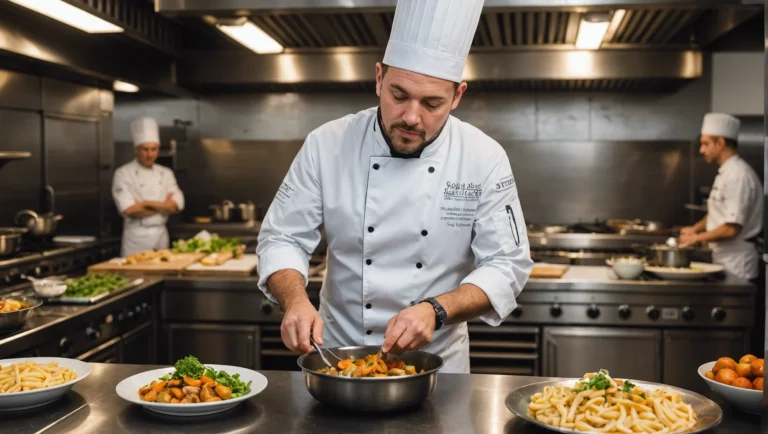As a business owner, you know that running a successful restaurant is no small feat. Your kitchen is the heart of your operation, and having the right team in place is crucial. That’s where the sous chef comes in – the second-in-command who keeps your kitchen running like a well-oiled machine. Explore how an assistant cook supports the culinary team by understanding their role, duties, and how they contribute to the efficiency of the kitchen operation.
Additionally, integrating a reliable delivery service can significantly enhance customer satisfaction while expanding your restaurant’s reach. Look into a trusted meal prep delivery solution that fits your establishment’s needs and supports your culinary offerings.
But what exactly does a sous chef do? And how can you hire and manage one effectively?
In this guide, we’ll dive into the key responsibilities, qualifications, and management strategies for sous chefs. Whether you’re a seasoned restaurateur or just starting, understanding the vital role of the sous chef is essential for building a strong, efficient kitchen team. Explore the advantages of implementing a staggered shift schedule for sous chefs to improve kitchen productivity and staffing flexibility.
Boost customer satisfaction with just a few clicks
Most-Loved Features:
- On-demand drivers
- Real-time GPS tracking
- Delivery confirmation photos
- Over 50% of customers report a smoother delivery experience
What is a Sous Chef? Responsibilities and Role in the Kitchen
-
Sous chefs are second-in-command in professional kitchens
-
They manage day-to-day operations and ensure food quality
-
Sous chefs assist with menu planning, staff management, and maintaining a clean and safe kitchen
Key Responsibilities of A Sous Chef
Sous chefs play a crucial role in ensuring the smooth operation of a professional kitchen. Their primary responsibilities include:
-
Assisting the head chef or executive chef in menu planning and recipe development. Sous chefs work closely with the head chef to create new dishes, refine existing recipes, and ensure that the menu aligns with the restaurant’s concept and target audience. They may also be responsible for calculating food costs and determining portion sizes to maintain profitability. What does it mean to be a sous chef? Explore the intricate tasks, unique challenges, and the incredible opportunity to shape culinary experiences in this pivotal role behind the scenes.
-
Managing kitchen staff, including line cooks and prep cooks. Sous chefs are responsible for scheduling, training, and supervising kitchen staff to ensure that everyone is working efficiently and effectively. They may also be involved in hiring new staff members and evaluating employee performance. Unlock the potential of your culinary team by understanding the core roles and functions of a sous chef, a vital part of restaurant management, to elevate your establishment’s dining experience.
Maintaining A Clean and Organized Kitchen Environment
Sous chefs are also responsible for the supervision and ensuring that the kitchen is clean, safe, and well-organized. This involves:
-
Implementing and enforcing food safety protocols, such as proper food storage and handling procedures, to prevent foodborne illnesses and ensure compliance with health department regulations.
-
Overseeing daily cleaning and maintenance tasks, such as washing dishes, sanitizing work surfaces, and organizing storage areas, to maintain a hygienic and efficient workspace.
-
Managing inventory and ordering supplies to ensure that the kitchen has all the necessary ingredients and equipment to operate smoothly. This may involve working with suppliers, negotiating prices, and monitoring usage to minimize waste and control costs.
Metrobi is transforming catering deliveries
Specialized solutions for catering businesses:
- Catering-trained drivers
- Proper handling equipment
- Peak day delivery support
- 23% average cost reduction
Sous Chef Responsibilities in a Restaurant
-
Oversee daily kitchen operations, ensuring consistent quality and efficiency
-
Manage and mentor the kitchen staff, fostering a positive work environment
-
Maintain strict adherence to health and safety regulations
Culinary Duties
A sous chef’s primary responsibility is to oversee the preparation and cooking of dishes in the kitchen. This involves working closely with the executive chef to develop menu items, create recipes, and ensure that each dish meets the restaurant’s quality standards. Sous chefs are responsible for preparing ingredients, cooking dishes according to recipes, and plating and garnishing dishes before they are served to customers. Explore the intricate role of a sous chef in the culinary world, focusing on their tasks ranging from recipe development to presenting dishes, and see how they are pivotal in bringing a menu to life, similar to how a food runner ensures a seamless dining experience.
Consistency is key in the culinary world, and sous chefs play a crucial role in maintaining the quality and consistency of the food served in the restaurant. They must have a keen eye for detail and a deep understanding of flavors, textures, and presentation. Sous chefs often taste dishes throughout the preparation process to ensure they meet the desired flavor profile and adjust as needed.
Collaborating with The Executive Chef
Sous chefs work hand in hand with the executive chef to develop new menu items and improve existing family recipes. This collaboration requires excellent communication skills and the ability to provide constructive feedback. Sous chefs may also be responsible for creating specials or seasonal menu items, allowing them to showcase their creativity and culinary expertise. Additionally, uncover the pivotal position of a manager in the kitchen, focusing on how they support and enhance the efficiency of kitchen activities and staff coordination.
Managerial Duties
In addition to their culinary responsibilities, sous chefs also play a significant role in managing the kitchen staff. They are responsible for scheduling shifts, supervising kitchen staff, and ensuring that everyone is working efficiently and effectively. Sous chefs must have strong leadership skills and the ability to motivate and inspire their team.
Training new hires and providing ongoing guidance to kitchen staff is another important aspect of a sous chef’s job. They must be patient, articulate, and able to communicate complex culinary techniques and procedures in a way that is easy to understand. Sous chefs also play a key role in fostering a positive work environment, promoting teamwork, and resolving conflicts as they arise. Discover innovative approaches to restaurant team training, ensuring your staff delivers both outstanding culinary experiences and efficient service.
Stepping In For The Executive Chef
In the absence of the executive chef, sous chefs are expected to take on additional responsibilities and lead the kitchen staff. This requires a high level of adaptability, problem-solving skills, and the ability to make quick decisions under pressure. Sous chefs must be prepared to handle any challenges that arise, from equipment malfunctions to unexpected rushes of customers.
When the executive or chef de cuisine is away, sous chefs are responsible for maintaining the same high standards of quality and consistency that customers have come to expect from the restaurant. They must be able to communicate effectively with the front-of-house staff, ensuring that orders are prepared correctly and delivered promptly.
Sous Chef Qualifications and Skills
-
A sous chef needs a mix of education, experience, and essential skills to excel in their role
-
Culinary degree or equivalent experience, along with several years in professional kitchens, is crucial
-
Strong culinary skills, leadership, communication, and the ability to work under pressure are key traits
Education and Experience of The Head Chef
A sous chef typically needs a combination of formal education and hands-on experience to qualify for the position. Many employers prefer candidates with a culinary degree from an accredited institution, such as an associate’s or bachelor’s degree in culinary arts or a related field. These programs provide aspiring chefs with a solid foundation in culinary arts education techniques, food safety, and kitchen management. A culinary arts BA provides a sous chef with advanced knowledge and skills, contributing to their effectiveness in menu creation and kitchen leadership.
However, some talented chefs may forgo formal education and instead gain equivalent experience through years of working in professional kitchens. In these cases, a sous chef candidate should have a proven track record of progressively responsible roles in the culinary industry, demonstrating their ability to handle the demands of a high-pressure kitchen environment.
Culinary Degree Programs
Culinary degree programs offer a structured curriculum that covers a wide range of topics, including:
-
Culinary techniques and knife skills
-
Food safety and sanitation
-
Menu planning and recipe development
-
Kitchen management and inventory control
-
Nutrition and dietary considerations
These programs often include hands-on training in well-equipped teaching kitchens, allowing students to practice their skills to gain practical experience. Additionally, many culinary schools offer internship opportunities, enabling students to work in real-world restaurant settings and build their professional networks.
Professional Kitchen Experience
While a culinary degree provides a solid foundation, hands-on experience in professional kitchens is equally important for a sous chef. Aspiring sous chefs should aim to work in a variety of restaurant settings, ranging from casual dining to fine dining establishments, to gain exposure to different culinary styles and kitchen operations.
Working their way up through the ranks, from line cook to lead cook or station chef, allows aspiring sous chefs to develop their skills, learn from experienced chefs, and demonstrate their ability to handle increasing levels of responsibility. This progression also helps them build a strong work ethic, adaptability, and the ability to thrive in a fast-paced, high-pressure environment.
Essential Skills for A Sous Chef
In addition to education and experience, a successful sous chef must possess a range of essential skills to excel in their role. These skills include both technical culinary abilities and important soft skills that enable them to lead and manage a kitchen team effectively. Discover the critical qualities that define a proficient sous chef, from mastering culinary techniques to leading a team with finescence, highlighting how these skills parallel the supportive role similar to that of a Bussing Staff member in restaurant operations.
A sous chef must have a deep understanding of culinary techniques and be proficient in executing a wide range of various cooking skills and methods. They should be skilled in:
-
Knife skills and food preparation techniques
-
Cooking methods, such as sautéing, grilling, roasting, and braising
-
Baking and pastry skills
-
Flavor profiling and seasoning
-
Plating and presentation techniques
Sous chefs should also stay up-to-date with the latest culinary trends, ingredients, and techniques to bring creativity and innovation to the menu.
As the second-in-command in the kitchen, a sous chef must possess strong leadership and communication skills to manage and motivate the kitchen staff effectively. They should be able to:
-
Delegate tasks and responsibilities to team members
-
Provide clear instructions and guidance
-
Offer constructive feedback and mentorship
-
Foster a positive and collaborative work environment
-
Communicate effectively with the executive chef, front-of-house staff, and suppliers
Excellent communication skills are crucial for maintaining a smooth-running kitchen, ensuring consistent quality, and addressing any issues that may arise.
A professional kitchen can be a high-stress, fast-paced environment, and a sous chef must be able to perform at their best under these conditions. They should be:
-
Calm and composed under pressure
-
Able to think quickly and make decisions on the fly
-
Skilled at multitasking and prioritizing tasks
-
Adaptable to changing circumstances and able to problem-solve effectively
A sous chef who can maintain a cool head and lead by example during busy service periods is invaluable to the kitchen’s success.
Sous Chef Salary and Career Outlook
Average Salary for Sous Chefs
According to recent data, the average salary for a Sous Chef in the United States is $50,290 in 2024. However, for many sous chefs, chef salaries can vary significantly based on factors such as location, experience, and the type of establishment they work in.
In high-end restaurants and hotels, sous chefs may earn higher salaries due to the demanding nature of the work and the level of expertise required. On the other hand, sous chefs working in more casual dining establishments or in smaller cities may earn lower salaries. For example, the average salary for a Sous Chef in Washington is $72,939, while in New York, it is $64,659.
Career Advancement Opportunities
For ambitious sous chefs, there are several career advancement opportunities available:
-
Progression to head chef or executive chef roles: With experience and proven leadership skills, sous chefs can move up to become head chefs or executive chefs, overseeing the entire kitchen operation and menu development.
-
Specialization in a particular cuisine or type of establishment: Sous chefs can choose to specialize in a specific cuisine, such as French, Italian, or Asian, or focus on a particular type of establishment, such as fine dining, catering, or hotel restaurants. Specialization can lead to higher salaries and better job opportunities.
-
Entrepreneurship: Some sous chefs may aspire to open their own restaurant or catering business. This path requires significant planning, financial investment, and business acumen, but it can be a rewarding way to showcase their culinary skills and creativity.
The demand for skilled sous chefs is expected to remain strong as the culinary industry continues to grow and evolve. The Bureau of Labor Statistics projects a 6% growth in employment for most sous chefs and head cooks from 2019 to 2029, which is faster than the average for all occupations.
As consumers become more interested in unique dining experiences and high-quality, locally sourced ingredients, the need for talented and creative sous chefs will continue to rise. This trend, combined with the increasing popularity of food-related media and the growing emphasis on health and wellness, suggests a bright future for sous chefs who are passionate about their craft and committed to professional growth.
Hiring and Managing a Sous Chef in Your Restaurant
-
A sous chef is a critical role in ensuring a smooth, efficient kitchen operation
-
Hiring the right sous chef involves defining the role, conducting thorough interviews, and providing comprehensive training
-
Ongoing management includes setting clear expectations, encouraging open communication, and offering growth opportunities
Recruitment and Hiring
When looking to hire a sous chef, start by creating a detailed job description that outlines the key responsibilities and qualifications for the sous chef role well. This should include the specific culinary skills required, such as experience with certain cuisines or cooking techniques, as well as leadership abilities and a strong work ethic. For instance, a sous chef should be able to work with the head chef to perform all opening, closing, and other side duties, use kitchen utensils and equipment such as grills, ovens, and steamers to prepare excellent food, and communicate relevant, up-to-date information to kitchen staff.
During the interview process, you can ask candidates about their previous kitchen work experience elsewhere, their management style, and how they handle high-pressure situations. It’s also important to conduct reference checks to verify their work history and get insights into their performance and character. Discover what responsibilities a mixologist carries, including their role in crafting beverages and ensuring guest satisfaction.
Onboarding and Training
Once you’ve hired a sous chef, it’s crucial to provide a thorough onboarding process to ensure they understand your restaurant’s menu, recipes, and standards. This should include a detailed orientation of the kitchen layout, equipment, and inventory management systems. Pairing the new sous chef with the head chef for hands-on training and mentorship is an effective way to help them learn the ropes and adapt to your restaurant’s unique style and expectations. During this time, the head sous chef de cuisine also can share their expertise, provide guidance on recipe development, and offer feedback on the sous chef’s performance. Discover essential restaurant staff training methods to maximize your sous chef’s potential, guaranteeing top-notch performance and consistency in your kitchen.
Ongoing Management and Evaluation
To maintain a high-functioning kitchen, regular communication and performance evaluations are essential. Set clear expectations for the sous chef’s role and responsibilities, and schedule regular check-ins to discuss their progress, challenges, and successes. Encourage open dialogue between the sous chef and head sous chef means to foster collaboration and ensure everyone is working towards the same goals. This can involve joint menu planning sessions, discussing customer feedback, and brainstorming ways to improve kitchen efficiency.
Investing in your sous chef’s professional development is also important for retention and motivation. Offer opportunities for them to attend culinary school, workshops, conferences, or training programs to expand their skills and knowledge. This not only benefits the sous chef but also brings new ideas and techniques back to your restaurant.
By following these steps for hiring, training, and managing a sous chef, you can build a strong, cohesive kitchen team that consistently delivers high-quality dishes and exceptional dining experiences for your customers.
The Difference Between an Executive Sous Chef and a Sous Chef
-
Sous chefs and executive sous chefs have distinct roles in a kitchen hierarchy
-
The executive sous chef holds a higher position and has more administrative duties
-
Both roles require strong leadership, culinary skills, and the ability to manage a team
Sous Chef
The sous chef is the second-in-command in a kitchen, reporting directly to the head chef. Their primary focus is on the day-to-day operations of the kitchen, including:
-
Managing and scheduling kitchen staff
-
Ensuring food quality and consistency
-
Maintaining a clean and organized kitchen
-
Assisting with menu preparation and execution
Sous chefs are hands-on leaders who work closely with the kitchen team to ensure smooth service and high-quality dishes. They must possess excellent culinary skills, leadership abilities, and the capacity to work well under pressure. Uncover the essentials of a sous chef’s function, highlighting the spectrum of their tasks and how vital their role is in achieving culinary excellence.
Executive Sous Chef
In larger establishments, an executive sous chef is a higher-level role that supports the chief executive chef. While they share many of the same responsibilities as a sous chef, they also have additional administrative duties, such as:
-
Assisting with menu development and recipe creation
-
Collaborating on budgeting and cost control
-
Managing multiple sous chefs in large kitchens
-
Participating in hiring and training processes
Executive sous chefs are often groomed for future executive sous chef positions, as they gain experience in both culinary and managerial aspects of running a kitchen.
Comparing The Roles
While both sous chefs and executive sous chefs play crucial roles in a kitchen’s success, the main difference lies in the scope of their responsibilities. Sous chefs focus primarily on daily kitchen operations, while executive sous chefs take on more strategic and administrative tasks.
In terms of the kitchen hierarchy, the executive sous chef position ranks higher than the sous chef, often overseeing multiple sous chefs in larger establishments. However, both positions require a strong foundation in culinary skills, leadership, and the ability to thrive in a fast-paced, high-pressure environment.
Putting It All Together: The Key to a Successful Kitchen
A sous chef plays a crucial role in ensuring the smooth operation of a restaurant kitchen. From assisting with menu development to managing staff and maintaining food quality control, the sous chef is an indispensable asset to any culinary team. Struggling to find the right sous chef or looking to enhance your team by recruiting restaurant personnel? Learn valuable insights and methods to attract and keep top-notch restaurant staff on board.
Furthermore, implementing a reliable delivery service can enhance customer satisfaction and expand your restaurant’s reach. Consider exploring a reputable Chicago delivery solution that aligns with your establishment’s needs and complements your culinary offerings.
Additionally, leveraging a comprehensive Boston same-day delivery solution can significantly boost your restaurant’s operational efficiency, ensuring that customers receive their orders promptly and enhancing overall satisfaction without straining your kitchen resources.
By understanding the responsibilities, qualifications, and career trajectory of a sous chef, you can make informed decisions when hiring and managing this key player in your kitchen. Invest in your sous chef’s growth and development, fostering a collaborative relationship with the head chef to create a cohesive, efficient team. Additionally, enhancing operational efficiency through the right logistical support can yield significant benefits for your restaurant. If you’re looking to streamline your delivery process, consider exploring a reliable New York City same-day courier service that meets your unique business needs and complements your kitchen’s workflow.
How will you empower your sous chef to excel in their role and contribute to the success of your restaurant? Consider the steps you can take to attract top talent, provide ongoing support, and create a kitchen culture that values excellence, creativity, and teamwork.














